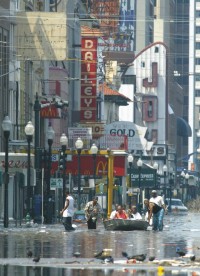Looting spirals in New Orleans
Thousands feared drowned, city mayor calls for all-out evacuation
AP, AFP, New Orleans
With thousands feared drowned in what could be America's deadliest natural disaster in a century, New Orleans' leaders all but surrendered the streets to floodwaters Wednesday and began turning out the lights on the ruined city perhaps for months.US President George W. Bush yesterday vowed "zero tolerance" for looters and other profiteers from the devastation left by Hurricane Katrina and said he would send in more troops if necessary. In an unexpected interview on ABC television, Bush also pledged maximum assistance for stricken areas of the US Gulf Coast, where hundreds were feared dead, and said Washington had not asked for any help from abroad. Looting spiralled so out of control that Mayor Ray Nagin ordered virtually the entire police force to abandon search-and-rescue efforts and focus on the brazen packs of thieves who have turned increasingly hostile. Late Wednesday, Tenet Healthcare Corp. asked Louisiana State Police and the US Coast Guard to help evacuate one of its hospitals in Gretna after a supply truck carrying food, water, medical supplies and pharmaceuticals was held up by gunmen. "We have to close it down because we can no longer ensure the safety of our patients or our staff in that hospital," Tenet spokesman Steven Campanini said of the 203-bed Meadowcrest Hospital. He said there were about 350 employees and between 125 to 150 patients inside the hospital, which is not flooded and is functioning. Earlier, Nagin called for an all-out evacuation of the city's remaining residents. Asked how many people died, he said: "Minimum, hundreds. Most likely, thousands." With most of the city under water, Army engineers struggled to plug New Orleans' breached levees with giant sandbags and concrete barriers, and authorities drew up plans to clear out the tens of thousands of remaining people and practically abandon the below-sea-level city. Nagin said there will be a "total evacuation of the city. We have to. The city will not be functional for two or three months." And he said people would not be allowed back into their homes for at least a month or two. If the mayor's death-toll estimate holds true, it would make Katrina the worst natural disaster in the United States since at least the 1906 San Francisco earthquake and fire, which have blamed for anywhere from about 500 to 6,000 deaths. Katrina would also be the nation's deadliest hurricane since 1900, when a storm in Galveston, Texas, killed between 6,000 and 12,000 people. A slow exodus from the Superdome began Wednesday as the first of nearly 25,000 refugees left the miserable surroundings of the football stadium and were transported in buses to the Astrodome in Houston, 350 miles away. Conditions in the Superdome had become horrendous: There was no air conditioning, the toilets were backed up, and the stench was so bad that medical workers wore masks as they walked around. In Mississippi, bodies are starting to pile up at the morgue in hard-hit Harrison County. Forty corpses have been brought to the morgue already, and officials expect the death toll in the county to climb well above 100. Tempers were beginning to flare in the aftermath of the storm. Police said a man fatally shot his sister in the head over a bag of ice in Hattiesburg, Miss.
|

Residents attempt to escape flood waters in New Orleans, Louisiana, in aftermath of Hurricane Katrina yesterday. With most of New Orleans submerged and thousands of people trapped by waters strewn with bodies, authorities also fought an outbreak of plundering by locals taking away food, appliances, jewels, clothes and even guns. PHOTO: AFP |